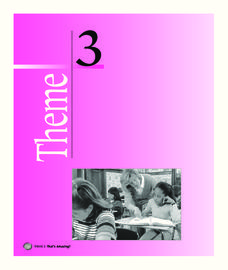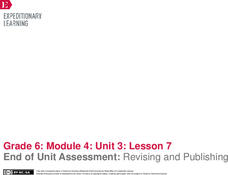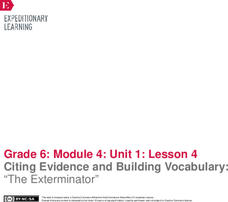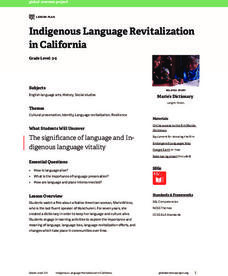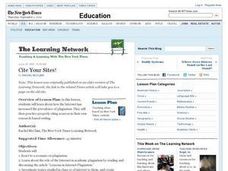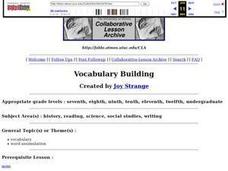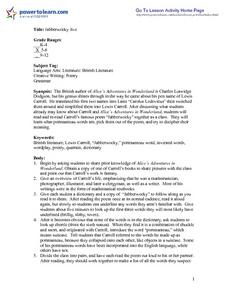Novelinks
The Tempest: A-Z Book Project
Create a picture dictionary for one of William Shakespeare's most famous plays. After readers finish The Tempest, they assign each letter of the alphabet to a concept or character, and add a description and evidence from...
Houghton Mifflin Harcourt
That’s Amazing!: English Language Development Lessons (Theme 3)
That's Amazing! is the theme of an English language development unit created by Houghton Mifflin. Following a speak, look, move, and listen routine, scholars delve into topics; seasons, weather, animals, landforms, telling...
Penguin Books
A Teacher’s Guide to the Signet Classic Edition of George Orwell’s 1984
Whether you're new to using Nineteen Eighty Four in the classroom or you're an Orwell veteran, the materials in this teacher's guide are a valuable addition to your curriculum. The suggested activities prompt readers to create a newspeak...
Reed Novel Studies
The Twits: Novel Study
The dictionary defines twit as a foolish person. Mr. and Mrs. Twit, in The Twits, definitely live up to their name! The foolish couple dislikes everything and enjoys playing cruel jokes on each other. Scholars read about the Twits...
EngageNY
Launching The Performance Task: Building Background Knowledge: “War in the Pacific,” Part 1
It's all about a bit of give and take. Scholars silently read War in the Pacific and circle any unfamiliar words. Using context clues, they write each word on a strip of paper along with the inferred definition. After looking the word up...
EngageNY
Reading for Gist, Answering Text-Dependent Questions, and Determining Author’s Purpose: Industrial Food Chain
A Reading Closely: Guiding Questions handout leads readers to discover the gist of The Omnivore’s Dilemma. While reading, pupils look closely at the words in the text and discuss their meaning. They use dictionaries when needed to answer...
EngageNY
Establishing Routines for Discussing A Long Walk to Water (Chapter 6)
Middle schoolers use a reader's dictionary to locate words they do not know in chapter 6 of A Long Walk to Water. They then turn attention to gist and work on a Salva/Nya anchor chart to record what happens to the characters....
EngageNY
Carl Hiaasen’s Perspective of Florida: Part 2
Look it up. Scholars read Florida: A Paradise of Scandals Excerpt 1 and use a dictionary to look up any unfamiliar words. They then do a close read of the text and answer text-dependent questions. Learners analyze author perspective by...
EngageNY
End of Unit Assessment: Revising and Publishing
Dictionaries, thesauruses, word walls, oh my! Pupils use several resources to revise their position papers to include appropriate vocabulary. Then, after peer editing, scholars write the final drafts of their essays and self-assess using...
EngageNY
Citing Evidence and Building Vocabulary: “The Exterminator”
It is an out-of-body experience. Scholars take a look at the sidebars outside the body of the text in The Exterminator. They discuss the purpose of this type of text feature and work to determine the gist. Learners write unfamiliar...
Simon & Schuster
Classroom Activities for The Call of the Wild by Jack London
Three activities are designed for readers of Jack London's The Call of the Wild. First, class members research and create posters that reflect the setting of the novel. Next, groups create posters with images that represent each chapter...
Global Oneness Project
Indigenous Language Revitalization in California
A film showcases a Native American woman and her hard work to create a dictionary detailing her tribe's language. While viewing, scholars reflect upon and discuss the importance of language and sustaining cultural identity.
Curated OER
Sonnet Explication
Learners analyze close readings of poems, looking up words in the dictionary, and discussing the major parts of dictionary definitions, including word origin and parts of speech. They examine sonnets, then compare/contrast their findings.
Curated OER
Math Prefixes
Students use a dictionary to gather appropriate information for writing simple definitions. They recognize prefixes that relate to numbers, such as mono-, bi-, and tri-. Pupils use their creative abilities to extrapolate new words to...
Curated OER
What's The Word?
Learners define vocabulary words using print or online dictionaries; create crossword puzzles with those words and definitions; and share their puzzles with peers for review.
Curated OER
Vocabulary Strategy: Call of the Wild
Here is a strategy for groups to contribute to whole class vocabulary development. Teams (based on seating rows) work together to look up dictionary definitions of words from upcoming sections of the book (though previous sections seem...
Curated OER
Cite Your Sites
What information would you find in an almanac that you would not find in an atlas? What is the difference between a dictionary and a thesaurus? Using a Cite Your Sites worksheet on which they record their observations, groups participate...
Curated OER
Talking Trash
Define vocabulary related to global waste. Creative thinkers review and illustrate terms for the Global Garbage Picture Dictionary. They play a vocabulary game in which co-operative skills among players in encouraged. A great way to...
One Stop English
Brexit
Brexit. Eurosceptics. Titanorak. Frankenstorm. Check out a neat worksheet and the attached article. It's all about buzzwords and how they are birthed. Whoda thunkit.
Curated OER
Vocabulary Building - Declaration of Independence
Young scholars read the first part of the Declaration of Independence and mark the words they don't know. First, they try to guess what the words mean by looking at the them in context, and then they look up the words in a dictionary.
Curated OER
"Jabberwocky" Jive
Pupils review the fantasy of Alice in Wonderland and discuss the author. After reading the poem, "Jabberwocky," they look up unfamiliar words in the dictionary. Working as partners, they create a list of "protmanteau" or invented words...
Curated OER
Formal and Informal Language
Words carry connotative baggage and some suitcases are bigger than others. Learners consult the Chambers School Dictionary to identify the formal, informal or slang words used in a series of exercises.
Curated OER
Spirit in the Night
Eleventh graders explain terms using the CD version of The American Heritage Talking Dictionary. They give and seek information in conversations and in group discussions.
Curated OER
Clown or Comedian
Students discover how to compare and contrast the differences between a clown and a comedian. They use dictionaries to expand their vocabulary.
Other popular searches
- Language Dictionaries
- Computer Dictionaries
- Biography Dictionaries
- Picture Dictionaries
- Acronym Dictionaries
- Using Dictionaries
- Art Dictionaries
- Dictionaries Encyclopedias
- Bilingual Dictionaries
- Online Dictionaries
- Grants for Dictionaries
- Glossaries Dictionaries



